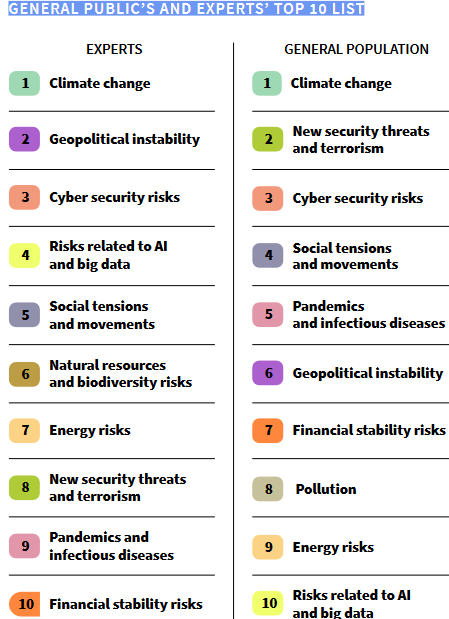Managing complex risks, nimble decision-making amid rapid technological advances and increasingly interconnected risks are top concerns, a recent AXA Future Risks Report outlined.
The annual survey asks 3,000 experts from 50 countries and a representative sample of 20,000 individuals from 15 countries to rank their top 10 emerging risks, based on their potential impact on society over the next five to ten years.
Of the experts surveyed, 87 percent believe the world is more vulnerable to risk than five years ago.

Climate change is the top concern of experts in every continent, according to AXA, with public awareness of the issue increasing just as much. Nearly 77 percent of the general public who selected this risk in their top five say they feel vulnerable to it in their everyday life, up from 73 percent in last year’s survey and tied for first place.
Coming in second is geopolitical unrest, ranked as the top risk by 16 percent of experts compared to 9 percent in 2023.
Cybersecurity rounded out the top three concerns likely the combined result of geopolitical instability, the increasing capabilities of artificial intelligence and dependency on large providers.
While not listed as a top risk, misinformation continues to be a concern.
When asked if they are confident in their own ability to assess the reliability of information on social media, 80 percent of experts and 78 percent of the general public said “yes”.
The survey explored the responses further, asking whether respondents think people generally have this ability, 75 percent of experts and 60 percent of the general public said “no”.
According to AXA, these findings suggest ” that most people are aware that misinformation and disinformation are a problem – but also that many people may have a blind spot about their own vulnerability to being manipulated and misled.”
There is evidence AI is being used to spread disinformation, but experts said the technology could also be used to screen for it.
Another area of concern, social tensions and movements, is largely impacted by an aging population. Those in younger demographics are more likely to question democracy and shy away from party affiliation.
The survey found that in order to address these emerging risks, public awareness and government authorities’ preparedness must improve.
A majority of experts and the public believe that “insurers’ role in safeguarding against emerging risks will be crucial in the future.”
Transparency, communication, modeling and analytics and continued institutional investments are key factors in successfully navigating the next five to ten years, AXA stated.
The survey asked respondents from AXA’s corporate clients and commercial partners to choose their main expectations of insurers in relation to future risks.
Rounding out the top three were risk management and transfer for innovative solutions (74 percent), knowledge sharing and education on risks (71 percent) and support in prevention and resilience building (63 percent).





















 Modern Underwriting Technology: Decisive Steps to Successful Implementation
Modern Underwriting Technology: Decisive Steps to Successful Implementation  Allianz Built an AI Agent to Train Claims Professionals in Virtual Reality
Allianz Built an AI Agent to Train Claims Professionals in Virtual Reality  Preparing for an AI Native Future
Preparing for an AI Native Future  What Analysts Are Saying About the 2026 P/C Insurance Market
What Analysts Are Saying About the 2026 P/C Insurance Market 